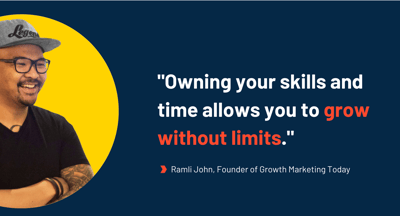February 20, 2023
 by Lauren Pope / February 20, 2023
by Lauren Pope / February 20, 2023

The feeling is as familiar as it is ugly. You’re sitting in a room of your peers and suddenly get a twisting feeling in your gut that you don’t belong there.
Does that sound like a situation you’ve been in before? You’re not alone. Imposter syndrome is something that every working professional will deal with at some point in their career.
There’s a misconception that advancing your career will eventually help shake those feelings of inadequacy. And while imposter syndrome does affect people of every race, gender, age, and class, it can be especially harmful to professional women looking to break the glass ceiling.
Imposter syndrome is an internal psychological experience regarding chronic feelings of inadequacy, incompetency, and feeling like a phony or a fake in an area of one's life, regardless of education, experience, or the success achieved.
There will be points in your career when you feel inadequate or in over your head – but thankfully, it’s not an experience you have to have alone.
Understanding imposter syndrome is the first step towards squashing it and continuing your career growth, which can be taken one step further with the help of career management software. These tools can better support employees' individual career development, enhance their skills, and identify career goals.
There are five types of imposter syndrome an individual may experience. They are:
If you think you may have imposter syndrome, here are some characteristics and signs to watch out for.
Imposter syndrome was around long before there was a popularized term for it. Feelings of self-doubt or self-consciousness are things that everyone can relate to. Thankfully, there are proactive steps you can take to help you recenter yourself and shake off your imposter syndrome.
of female professionals between the ages of 25-34 are currently experiencing imposter syndrome.
Source: Innovate MR
We’ve sourced advice from women across industries and career fields for their best advice on recognizing and dealing with imposter syndrome.
“The best way to shake off your imposter syndrome is to take the opportunity to teach and mentor. People are hungry for experiential knowledge, and you don't realize how much you have learned until you sign up to teach a 60-minute class or sit down to answer some questions one-on-one over coffee. You get to organize your lessons learned, and you get to help out others in your community.”
– Jessica Day, Co-Founder and CMO at IdeaScale
“A quick trick to overcome imposter syndrome: Write out your entire career history. I was interviewed for a podcast and thought, ‘I'm only 21, I don't have a great story to share’ until I wrote down three pages of stuff I'd done and completely forgotten about.”
– Elise Dopson, as quoted from her Twitter account
“If you’re prone to imposter syndrome, start keeping a ‘Love Me’ file on your desktop. It can be something as simple as Word document where you file notes from colleagues, managers, clients, customers, and anyone giving you 'props' for a job well done. You can also add projects you've worked on, and successes you've had at work. Every time you feel imposter syndrome coming on, go back to it, read the whole thing, and let it sink in.
Each of us are so busy in our day-to-day lives that we often forget to step back and take a look at the amazing work we've done to get to where we are in life.
Maureen McCannn
Executive Career Strategist, Promotion Career Solutions
“I try to focus on why I got the job – my skill sets, my experience, my capability, and the confidence of the people who hired me. I also enjoy talking with my peers because they are the best at helping put things into perspective.
Being willing to constantly learn on the job helps up my game and gives me a confidence boost. If I feel self-conscious for not knowing something, I’ll just go out and learn as much about it as I can.”
– Supriya Kumar, Vice President of Marketing at Vayana Network
“As a woman working in a male-dominated field, a Sergeant in the NYPD and a Director at NYC Emergency Management, I have to overcome not only my own self-limiting beliefs, but do that in a male-dominated world.
Christine Maier
When I found a publisher for my book, I decided to be upfront with him about my learning disability. I had always believed it would hold me back with writing and publishing a book. It turns out being honest really benefited me. My publisher also had a learning disability. He had already published six books and understood my unique challenges. I chose to work with him because I knew he would believe in me when I didn't believe in myself.”
– Christine Maier, Author, Coach, and Speaker
“I stepped into my first Director level role before I even turned 25. Needless to say, I sometimes wondered if I was supposed to be in the role I was offered. I was terrified I wouldn’t be able to live up to the expectations that they had for me.
Whenever I had a moment of self-doubt or worry, I would channel that energy into learning anything and everything. I would read everything about my industry, business, management, and thought leaders because if you are not learning you are not growing. This helped get me out of the imposter syndrome. I would learn new things, adapt them to my role, and keep evolving to provide value to my firm, and then one day, I no longer felt like an outsider but a significant addition to the team.”
– Kelly Anderson, MBA, Marketing Director at Wealth Continuum Group
“To deal with ‘imposter syndrome,’ you must accept that you are enough.
Christine Liu
By treating imposter syndrome as if it blossoms only in the recesses of the mind, we absolve ourselves of addressing sexism, racism, and the culture of overwork that may be causing the imposter experience. Imposter syndrome is not necessarily a disease of the mind, but perhaps a disease of the system.”
– Christine Liu, as quoted from her piece originally published on Quartz
“Before I decided to take the leap into self-employment, it was so hard for me to shake the feeling that I was being judged during job interviews or even during a job while on a client call.
Even when I had dozens of clients and experience under my belt, I would often wonder, who am I to be running this program or giving this advice? What if it fails? Even when it was going well and even when I knew exactly what I was doing, it was hard not to feel scrutinized by those around me, and often led to moments of self-doubt.
I finally found that focusing on the success that I’ve had instills confidence in me. It's best to not put weight on others' opinions or your perceived judgment of their opinions since that will only end up undermining you and your work. Focus on being the best, and the confidence will follow.”
– Stacy Caprio, Self-Employed Business Coach
The next time you’re feeling self-conscious about your success, remember that you deserve to be where you’re at today, just like these women in marketing, sales, business, and beyond. You worked hard and fought for what you have. Don’t be ashamed; own it!
Constantly feeling like an imposter in your career has serious repercussions, including experiencing burnout. Learn the types and causes before it's too late.
This article was originally published in 2019. It has been updated with new information.
Lauren Pope is a former content marketer at G2. You can find her work featured on CNBC, Yahoo! Finance, the G2 Learning Hub, and other sites. In her free time, Lauren enjoys watching true crime shows and singing karaoke. (she/her/hers)
Founder and host of the Growth Marketing Today podcast, Ramli John shares how he made an...
 by Lauren Pope
by Lauren Pope
No matter how many presentations you’ve led, it’s normal to have butterflies.
 by Mara Calvello
by Mara Calvello
Saving for retirement can be a daunting task, but your 50-year-old self will be thankful you...
 by Devin Pickell
by Devin Pickell
Founder and host of the Growth Marketing Today podcast, Ramli John shares how he made an...
 by Lauren Pope
by Lauren Pope
No matter how many presentations you’ve led, it’s normal to have butterflies.
 by Mara Calvello
by Mara Calvello


